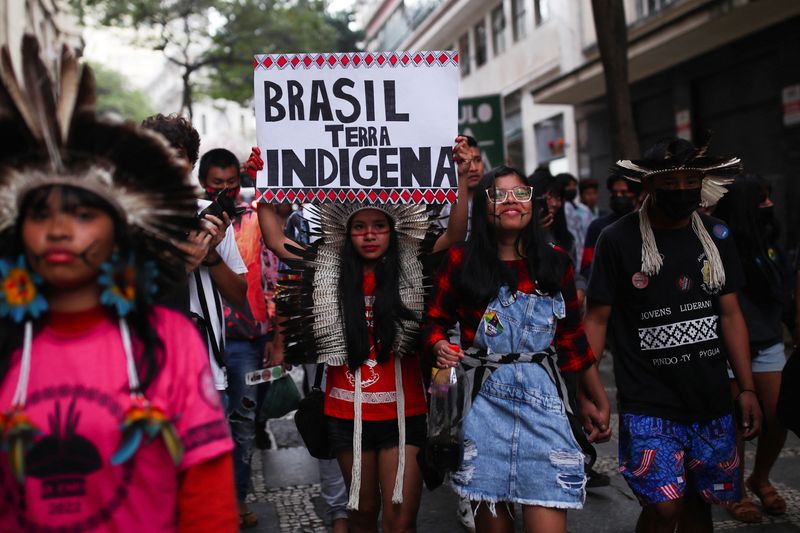Attacks on Brazil’s indigenous people rose sharply in 2021, report says
2022.08.17 23:45
3/3

FILE PHOTO: Indigenous people show a placard that says “Brazil indigenous land” during the International Indigenous People Day in defense of territories and Indigenous lives, against the government of President Jair Bolsonaro and for the demarcation of la
2/3
By Anthony Boadle
BRASILIA (Reuters) – Attacks on Brazil’s indigenous people and invasions of their lands by illegal miners and loggers, mainly in the Amazon (NASDAQ:AMZN), increased dramatically in 2021, escalating an already “terrifying” situation, the Catholic Church’s Indigenous Missionary Council (Cimi) said on Wednesday.
In its annual report on violence against indigenous people, Cimi detailed a dramatic intensification of abuses in the third year of President Jair Bolsonaro’s government, which has dismantled inspection and indigenous protection bodies.
Bolsonaro, a far-right nationalist, has encouraged the economic exploitation of indigenous reservations with new legislation and proposals to allow mining on indigenous lands, Cimi said.
“The invaders intensified their presence and brutality of their actions,” and increasingly used heavy weapons to attack villages that resisted their advance, the report said.
With more than 20,000 illegal gold miners on the Yanomami reservation on the border with Venezuela, invaders have begun armed attacks against indigenous communities, causing a climate of terror and deaths, including of children, Cimi said.
In Pará state, where surging wildcat gold mining has destroyed forests and polluted rivers, invaders have attacked Munduruku community organizations and tried to prevent their leaders from traveling to demonstrations in the country’s capital Brasilia, it said.
Bolsonaro’s office did not respond to a request for comment.
There were 305 invasions into indigenous lands in 2021, compared to 263 cases the previous year, almost three times more than the cases reported by Cimi in 2018, when Bolsonaro was elected president.
There were 176 murders of indigenous people, six fewer than in 2020, which had the highest number of homicides on record.
Suicides of indigenous people rose to 148 last year, the highest ever recorded.
Cimi also reported cases of murders carried out with extreme cruelty and brutality, such as those of Raissa Cabreira Guarani Kaiowá, aged 11, and Daiane Griá Sales, 14, from the Kaingang people. Both indigenous girls were raped and killed.
The government’s indigenous affairs agency Funai declined to comment, saying it had not seen the Cimi report.
Funai, created in 1967 to protect Brazil’s 300 tribes, half of which live in the Amazon rainforest, said in a statement that it acts with environmental and law enforcement agencies to combat illegal activities on indigenous lands.
To run Funai, Bolsonaro appointed a police known for helping farmers in land conflicts with indigenous people.








